On April 1, Israel doubled the area where Palestinians can fish in the Mediterranean Sea off of the Gaza Strip as part of Egyptian-brokered talks with Hamas. The distance fishermen can operate in was extended from 6 nautical miles at the narrowest sea corridor, to 15 nautical miles at the widest.
This is the first time that part of the fishing zone has been extended to this distance since restrictions on access took effect in 1995, following the implementation of the Oslo Accords. One main benefit, Reuters reported, is that Palestinian can now reach deep sea fish like tuna and mackerel, and Gaza’s most-desired fish, grouper.
Yet for Gaza’s shallow water fisherman, the extension of the fishing zone has no impact.
At the end of a 12-hour day, Wayel al-Habeel, 46, said he can catch a combined 45 pounds of crab, shrimp and anchovy, regardless of the fishing zone.
“I was catching the same amount when we were boating 6 miles a few days ago,” said al-Habeel. He said the rush to excitement amongst Palestinians is short-sighted. “We are being tricked again by Israel’s decision.”
Al-Habeel owns a 45-foot boat with his three brothers. They dock it at the Gaza Port in the western part of Gaza City.

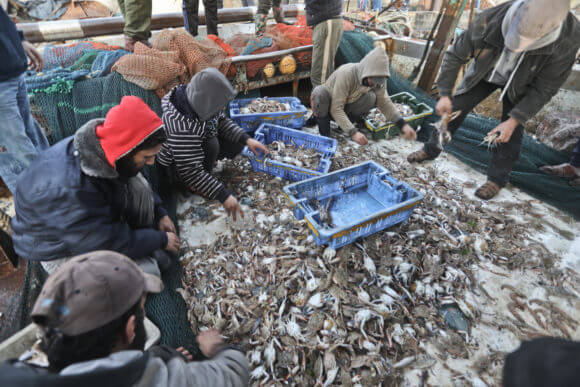

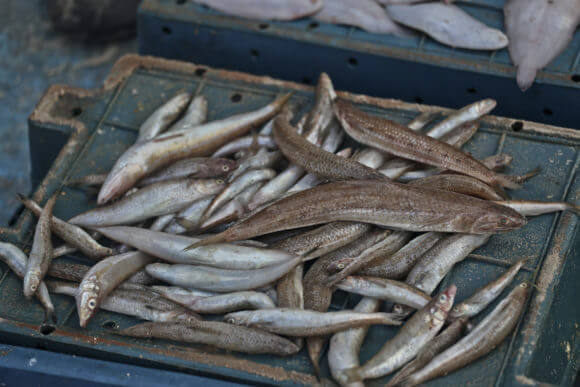
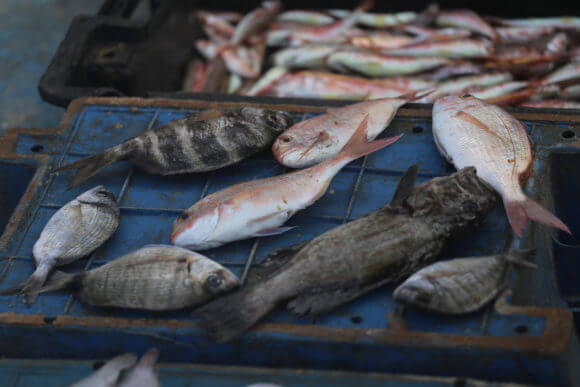
According to the new regulations, fisherman can travel to 15 nautical miles out a narrow sea corridor in the southern Gaza Strip between Deir Al Balah and Rafah, a distance of about nine miles north to south. Between Deir Al Balah and the Gaza Port in Gaza city, another eight miles, fishing is allowed up to a distance of 12 nautical miles.
Sea access in the northern area of Gaza is still limited to only 6 nautical miles from Gaza’s coast.
Zakaria Baker, the head of a fisherman and agricultural workers’ union told Mondoweiss, “The sea off of the southern area that was expanded today has shallow and rocky areas, meaning that the potential catch is poor.”
He said the widest range Israel has permitted over the last decade is 12 nautical miles. At times, the limit was decreased to 1 nautical mile.
In the areas of sea closest to Gaza’s border with Egypt to the south and Israel to the north, the fishing zone is still limited to 1 nautical mile out to sea.
Musa Baker, 45, a fisherman, said that the non-expanded zone is the richest in terms of the catch of fish. Both Musa and al-Habeel have worked as fishermen since 1987.


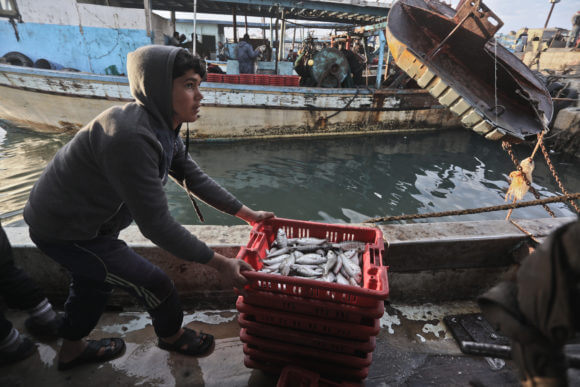
Many fishermen are concerned about the presence of the Israeli navy. In the past it has turned Gaza boats around or fired on them. Sometimes boats and fishing equipment are confiscated, and fisherman have been arrested. Thursday morning Ma’an News reported the Israeli navy fired on fishermen 2 miles out at sea in an area where the fishing zone is 6 miles.
The Gaza based Al Mezan Center for Human Rights documented 1283 incidents of abuses by Israeli forces on the seas since 2000, including killing 8 fishermen, injuring 134, arresting 656, and seizing or destroying 209 boats.
There are 3,500 commercial fishermen in the Strip, operating some 1,000 boats.
Al-Habeel said his own boat was fired at and is still punctured with holes. “Who would stop them from fatally shooting me or arresting me?” Indeed al-Habeel said he has been detained “maybe more than 20 times” by the navy while at sea.
In addition to the Israeli navy harassing the fishermen, technical challenges stand ahead for the Gaza’s professionals watermen.
Import restrictions on Gaza make boat repairs tremendously costly and limited. Boats with Yamaha engines are often fixed with scrap parts from trucks.
Gaza fisheries sector lacks access to essential imports, including fiberglass, boat engines and spare parts, which are restricted by Israel as “dual use” items. Fishing nets and other items are often too expensive for fishermen on their limited income.
Mohammed Shehadeh, 57, said his boat floating at the Gaza Port is totaled. He needs a new engine but cannot find one for sale, nor can he afford to repair the one he has.
“My boat has docked here since last summer,” said Shehadeh, who used to employ 14 young fishers on deck.
“I lament that everyday since I am broke and am not able to pay for the workers?” he said.
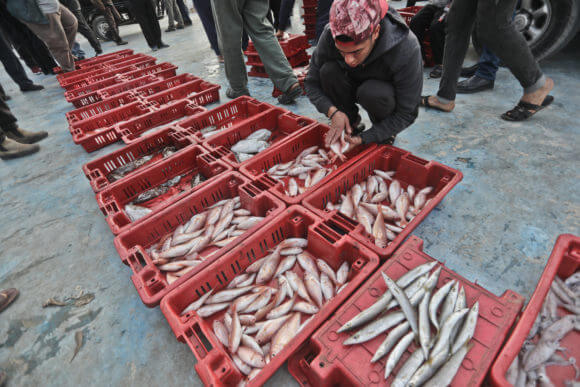
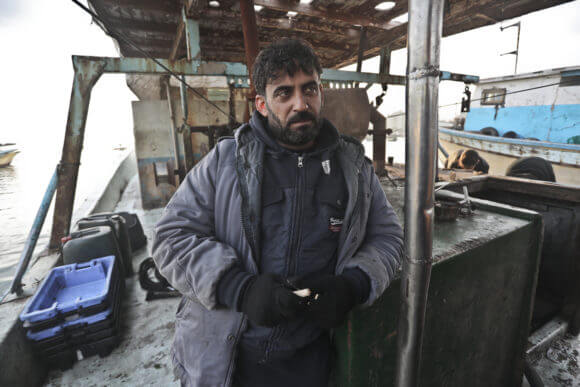

At 8 a.m., al-Habeel sits on an empty crate used to carry fish at a street market near the port. He still has five crates full of unsold fish, as he expected.
“No fool would waste his little money on such tiny anchovy, after hearing about the new expanded 15 miles!” he said.
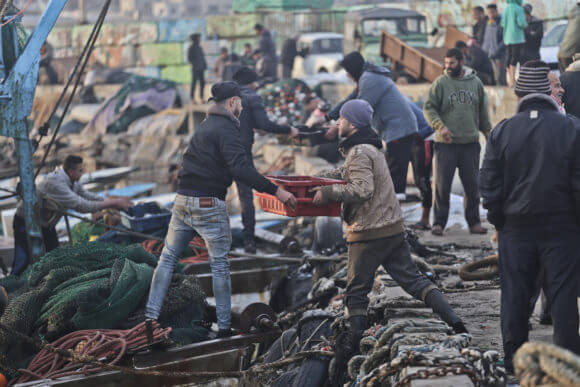


RE: “Zakaria Baker, the head of a fisherman and agricultural workers’ union . . . said the widest range Israel has permitted over the last decade is 12 nautical miles. At times, the limit was decreased to 1 nautical mile.” ~ Ahmad Kabariti
■ FROM ALISTAIR CROOKE, London Review of Books, 03/03/11:
SOURCE – http://www.lrb.co.uk/v33/n05/alastair-crooke/permanent-temporariness
1. The restrictions on fishing distance were imposed during the Intifada. By 2002, the Gazans had been fishing for up to 15 nautical miles. Hamas naval terrorism has developed and Israel has taken a basic action required to reduce its risk, as required by law’ moral and logic. In cases where terrorists disguised as fishermen and crossed the line into Israel’s territorial waters, Israel managed to stop them, some were captured and on sea and others were killed in a gunfight on the sea or on the shores of Israel.
2. The fact that Gazan fishermen do not make full use of the fishing space is not Israel’s problem but rather for fishermen with their Hamas leadership.
3. The Oslo agreement, if anything still remains, does not include Gaza because the Hamas government never accepted it. On the contrary, Hamas rejected the treaty and started wave of terror actions because of it.
4. Hamas leaders declare again that they desire to destroy Israel, they prepare their armaments and the mood of their citizens for the great clashes with Israel. The last year fence demonstrations are part of their efforts to wake up the שאננים, to tie them with the terrorist שורת הפיקוד but at the same time to collect Gazans angry and despair from the failed incompetent Hamas organization/government. Hamas is an undemocratic government that violates the election rules and roams its citizens, in order to strengthen its status and leaders. When the Gazans demonstrated about a month ago, the Hamas policeman went out and beat them mercilessly. A number of seriously injured people were rushed to Israel, where their lives were saved.
5. My recommendation to the Gazans, and in general to the Palestinians: accept the right of the Jews to a nation-state in the Land of Israel alongside a Palestinian Arab state and live with it in peace, and you will prosper economically and mentally. Your life will become a Real New Middle East, not that one of murderous and betrayal world that lies out of the Israeli borders, from Algeria to Pakistan.
Why should anyone pay attention to what Israel says? Look at what they do.
And the quote above, about “permanent temporariness,” is very revealing. It leads to the question of why Israel does this – just to make people’s lives a burden? To justify what it has done in the past to the people of Gaza by doing more of it today?
Of course, Israel has inflicted countless abuses on Gaza.
Just looking at pictures of it, you have to wonder where the world’s humanity has fled.
But I find the stories about the fishermen especially touching, this one and others in the past, such as fishermen being shot at and shot.
Here are a people living by the sea, not even able to fully partake of its bounty.